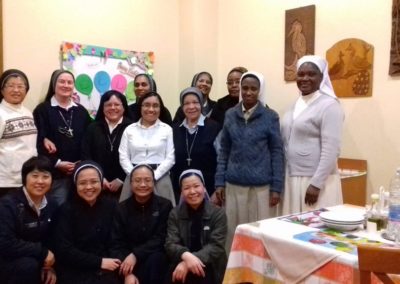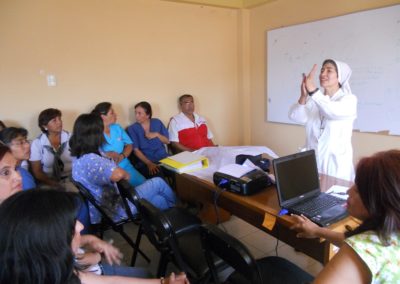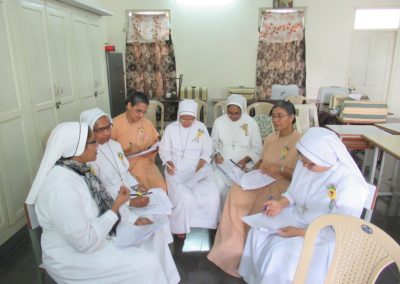Development of Charism
The challenges of our times which in their very contradictions hide a deep yearning for religiosity, together with the Church’s appeal to promote a spirituality of communion, induce us to live up to our charism by cultivating a timely dialogue of charity in our relations with those we meet and serve through the works of mercy in accordance with our apostolic project.
With this aim in mind, we draw on our womanly resources and on values of internationality and interculturality that characterize our Institute.
We live by this gift of communion first of all in our fraternal life as sisters who partake of the same founding charism and share spiritual and material goods, and as disciples of Jesus ever on our way together, sustained by merciful love for one another.
The increased internationality of the Institute is for us a source of richness impelling us to welcome and value cultural diversities and committing us to tackle calmly any limits or difficulties that dialogue involves.
Made capable, by grace, of reciprocity and communion among ourselves, we strive to carry on a dialogue of charity in our apostolic service: we do this by fostering a sense of universal brotherhood in Jesus the Redeemer, remaining in solidarity with the poor and going through a process of inculturation, without which we cannot be true neighbours today.
This demands that we be discerning, willing to learn from what is different and to develop a readiness for collaboration in Church and in society, effecting an exchange of gifts that is typical of genuine service.
True to our identity as consecrated persons committed to follow Jesus the Redeemer, who for our sake took the “form of a servant” and wanted us all to be one in himself, we strive to promote a culture of solidarity and to foster a spirituality of communion in the ecclesial and human family, so that all may live as God’s children in the Father’s household.
Our mission today
Wherever we are, we try to bring to fruition the “talent” given us for the benefit of our neighbour, through educational work, health care and formation to faith, while remaining alert to particular demands of our times and seeking ways most suited to the context in which we live.
We realize that inculturation is “a path we all must go by in order to be true neighbours” and do works of mercy with the same attitude of Jesus who “emptied himself, taking the form of a servant”.
In communion with him, who “came to serve”, and is always at work in human history, we take care of our neighbour putting to good use our typically-womanly resources and the virtues proper to our spirituality, training ourselves in dialogue and sharing and in collaboration with other ecclesial strengths.






